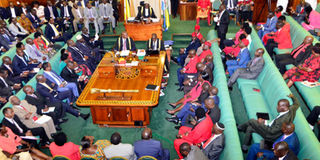Age limit Bill: Will MPs follow voters or party?

Parliament in session on Tuesday. PHOTO BY ALEX ESAGALA
The period that the Speaker of Parliament, Ms Rebecca Kadaga, gave to MPs to carry out public consultations following the tabling of the Private Members’ Bill to amend Article 102 (b) by Igara West MP Raphael Magyezi to scrap presidential age limits on September 27, is over.
The presentation of the report by the legal and Parliamentary Affairs Committee and debate is expected to be swiftly disposed of to allow for a vote on the amendment of the Constitution.
An amendment of Article 102 (b) of the Constitution requires a two thirds majority of MPs who are eligible to vote. Mr Raphael Magyezi would, therefore, need the backing of at least 290 MPs to see his bill through.
The NRM has 294 MPs and about 56 independent MPs aligned to it. A “Yes” vote would, therefore, appear to be already in the bag, but President Museveni, who stands to be the biggest beneficiary of the amendment as it would then allow him to contest for another term in office if he wishes to, is not leaving anything to chance.
He is reported to have told the NRM parliamentary caucus on Tuesday that he wanted all of them to vote for the proposed amendment.
His position is understandable. That the NRM has the numbers is certain, but whether they will all obey him is not – at this point.
Daily Monitor survey
A study carried out by the Daily Monitor revealed that 53 per cent of 336 MPs were for the amendment, 29 per cent against and 18 per cent undecided.
The numbers diminish further when it comes to NRM MPs. Only 50 per cent were for the amendment, 7 per cent against and 14 per cent undecided. Twenty nine per cent did not respond to the question.
Prior to that poll, Afro-barometer had at the end of September released findings of a survey that revealed that 75 per cent of Ugandans across the political divide and of all ages and gender were against the proposed amendment.
Ccedu survey
Then on December 8, findings of a nationwide survey conducted by the Citizens’ Coalition for Electoral Democracy in Uganda (Ccedu), between October and November, revealed that only 15 per cent of the respondents were for the proposed amendment.
The Ccedu survey also went into Mr Raphael Magyezi’s Igara West and Mr Moses Balyeku’s Jinja West constituencies and foud out that the support for the Bill stood at 15 per cent and 8 per cent, respectively. The two MPs are the movers of the motion to amend the Constitution.
Lack of public support for the amendment has in instances taken a violent twist.
Kassanda South MP Simeo Nsubuga was roughed up in July, Butembe County MP Nelson Lufafa’s car was smashed by stone-throwing youths and Rubirizi MP Grace Kasande Bataringaya had to literally flee from residents of Rutoto Sub-county.
These attacks prompted the NRM caucus to advise its members to switch from “public consultations” to consulting “targeted groups” of opinion leaders and local councils. This perhaps explains why some MPs’ position on the Bill is at variance with that of their constituents.
We, however, know how ruthless the NRM has been with its members who do not toe the line. In April 2013, MPs Theodore Ssekikubo, Muhammad Nsereko, Wilfred Niwagaba and Bernabas Tinkasiimire, were fired for alleged indiscipline. Eight MPs who disagreed with the Magyezi motion were also thrown out of a meeting of the NRM caucus.
Despite having earlier mended fences with the party in 2016, MPs Tinkasiimire and Ssekikubo found themselves against a machinery of a party that sought to drive them into political oblivion because of their rebelliousness. No one wants to come up against the might of Mr Museveni and the NRM.
The question now is how, in the circumstances, will they vote? Will it be in line with the aspirations of the people they represent? Or will they submit to the party line?
Running with the party is likely to have some short-term and “juicy” benefits, including a possible cash reward, appointment to the Cabinet (for some) and an extension of their tenure in Parliament from five to seven years. This will, however, put them on a collision course with constituents who might not be for the Bill.
MPs can, on the other hand, take the line of their constituents and risk the wrath of Mr Museveni and the NRM.




